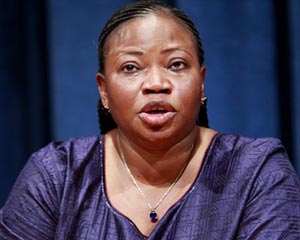
UNITED NATIONS – Libya should not grant amnesty for war crimes committed during last year’s uprising against former Libyan leader Muammar Gaddafi, regardless of who committed them, the chief prosecutor of the International Criminal Court said on Wednesday.
Report by Reuters
In her first official presentation to the U.N. Security Council as The Hague-based court’s top prosecutor, Fatou Bensouda said that the ICC’s pre-trial chamber would decide “in due course” on whether the late Libyan leader’s son Saif al-Islam Gaddafi should be tried in Libya or The Hague.
Bensouda recalled the Libyan authorities’ stated commitment to ensuring that there would be no impunity for crimes committed during the fight to overthrow Gaddafi, who was captured and killed by rebels in October 2011 after a half-year civil war.
She pointed to a recently approved Libyan law that raises the possibility of amnesty for “acts made necessary by the 17 February revolution,” apparently creating the possibility of not prosecuting crimes committed by anti-Gaddafi fighters.
“I encourage the new Libyan government, scheduled to be sworn in tomorrow, on 8 November, to ensure that there is no amnesty for international crimes and no impunity for crimes, regardless of who the perpetrator is and who is the victim,” she told the 15-nation council.
Bensouda said she understood that the Libyan government has committed itself to a strategy of addressing all crimes committed in the country.
“I encourage the government of Libya to make this strategy public, and to work with key partners to receive feedback on this strategy and to seek out the views and concerns of victims in Libya. Early finalization of this strategy will be yet another milestone on Libya’s path to democracy and rule of law.”
- Chamisa under fire over US$120K donation
- Mavhunga puts DeMbare into Chibuku quarterfinals
- Pension funds bet on Cabora Bassa oilfields
- Councils defy govt fire tender directive
Keep Reading
Richard Dicker, an international law expert at Human Rights Watch, welcomed Bensouda’s remarks on the Libyan amnesty law, which he described as “an affront to victims of serious crimes and a flagrant violation … of Libya’s responsibilities.”
TUG OF WAR
Libyan Deputy U.N. Ambassador Ibrahim Dabbashi told the Security Council that Tripoli was not “neglecting any case (based on) the identity of the accused.” But he said Libyan authorities’ initial focus would be on the Gaddafi regime.
Libya is not an ICC member but the Security Council referred Gaddafi’s violent crackdown on pro-democracy protesters during last year’s Arab Spring uprising to the ICC in February 2011. That makes Libyan cooperation with the court mandatory.
Bensouda said her office continued to gather information on a possible second Libyan case focusing on allegations of rape and sexual violence targeting men and women, allegations against other members of Gaddafi’s government, and charges of crimes committed by rebel forces.
“I will take a decision on the direction of a possible second case in the near future,” she said.
Libyan authorities have refused to extradite Saif al-Islam Gaddafi to face charges in war crimes committed during the NATO-backed revolt that toppled his father last year. Libya wants to try Saif al-Islam in its own courts, but judicial experts say he is unlikely to get a fair trial.
ICC judges will rule whether Libya is capable of properly trying the man once seen as Gaddafi’s heir-apparent or whether it should extradite him to The Hague.
Earlier this year, a lawyer appointed by the ICC to defend Saif al-Islam was detained in Libya for three weeks on spying allegations and said her experience had shown it was impossible for him to get a fair trial in his home country.
“If … the Court rules that the case should be heard before the ICC, I will count on Libya’s full support and cooperation to ensure that the ICC’s proceedings are both successful and are seen to be successful by the Libyan public,” Bensouda said.
In addition to the ICC indictments against Gaddafi and his son Saif al-Islam, the court indicted Gaddafi’s former intelligence chief Abdullah al-Senussi, one of the most feared members of Gaddafi’s inner circle, for war crimes.
His capture in Mauritania in March triggered a tug of war between Libya, France and the ICC for his extradition.
Dabbashi reiterated Tripoli’s call for countries to extradite to Libya any members of the Gaddafi regime wanted in connection with past crimes.











